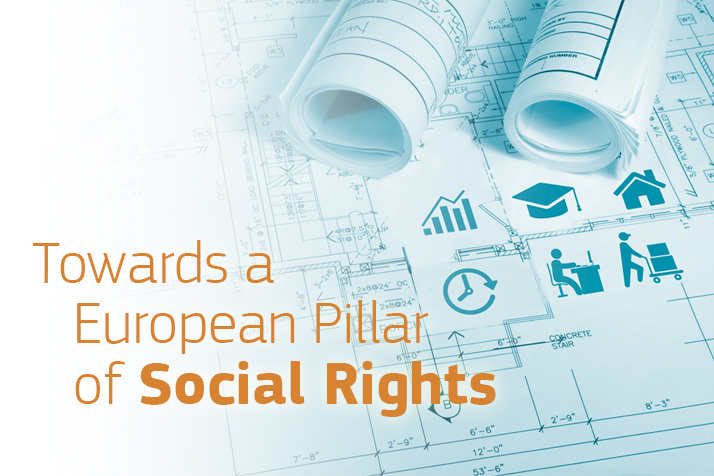Last chance for Europe to deliver on strong social rights for all
Published:
On 26 April 2017, the European Commission released the long-awaited European Pillar of Social Rights. Centered around overarching key principles and rights to support fair and well-functioning labour markets and welfare systems, the European Pillar of Social Rights represents a welcome stance towards a fairer and more social Europe. It is issued at a time where millions of citizens across Europe struggle with burdening austerity measures leading to the deterioration of living and working conditions, and is set to reaffirm the European Union’s commitment to ensure the upwards convergence of social rights. The Pillar promotes twenty principles and rights, such as access to quality and inclusive education, training and life-long learning for all, gender equality, social dialogue and involvement of workers in the design and implementation of economic, employment and social policies, and equal rights to parental leave for women and men.
Following the unveiling of the European Pillar of Social Rights, ETUCE Director Susan Flocken commented: “We welcome this positive development, which is of utmost importance for promoting inclusive education for all and the rights at the work place of every worker, including those of education personnel who are on the front line every day to giving everyone in Europe the right to quality education. The assertion that quality and inclusive education is a right for all students, as well as the proposal for a better work-life balance are forward-thinking and fundamentally needed”. “However” she continued “such strong declarations are issued in a tumultuous context. Stakeholders unconcerned by the European citizens’ interests are willing to see the Pillar’s implementation fail. At the same time, the financial crisis has deeply affected the political will to consider social rights as a priority.”
ETUCE is concerned that budgetary cuts imposed on the education sector across Europe in countries at risk of breaching the rules of the Growth and Stability Pact are threatening quality teaching and learning environments for all students – thus widening the equality gap in society and jeopardising the development of a sustainable labour-market. “To this day, throughout Europe” Ms Flocken concluded “public investment in education has yet to return to pre-crisis levels in several EU counties. The European Pillar of Social Rights is a significant step towards the recovery of the European society and its citizens. Now policy reforms are needed that consciously take into account of the social needs in Europe and are clearly geared towards social recovery at national and European level.”
The European Union is currently at a crossroads, as the European Commission’s President Juncker reminded in the White Paper on the Future of Europe. In order to address criticism and move forward, fundamental changes are required. Ultimately, the resolute, comprehensive and prompt implementation of the European Pillar of Social Rights is a crucial step towards reconciling the people with the European project’s ultimate goal – improving the lives of its citizens. To meet this objective, ETUCE actively seeks to provide European policy-makers with data and tools facilitating the success of this current, and future, initiatives on promoting social rights in the European Union.
For more information on the key proposals on the European Pillar of Social Rights, please click on Communication Establishing a European Pillar of Social Rights and its accompanying Staff Working Document, the Commission Recommendation, and the Staff Working Document introducing a Social Scoreboard. The European Commission also published a Reflection Paper on the Social Dimension of Europe.
The ETUCE press release can be read here.